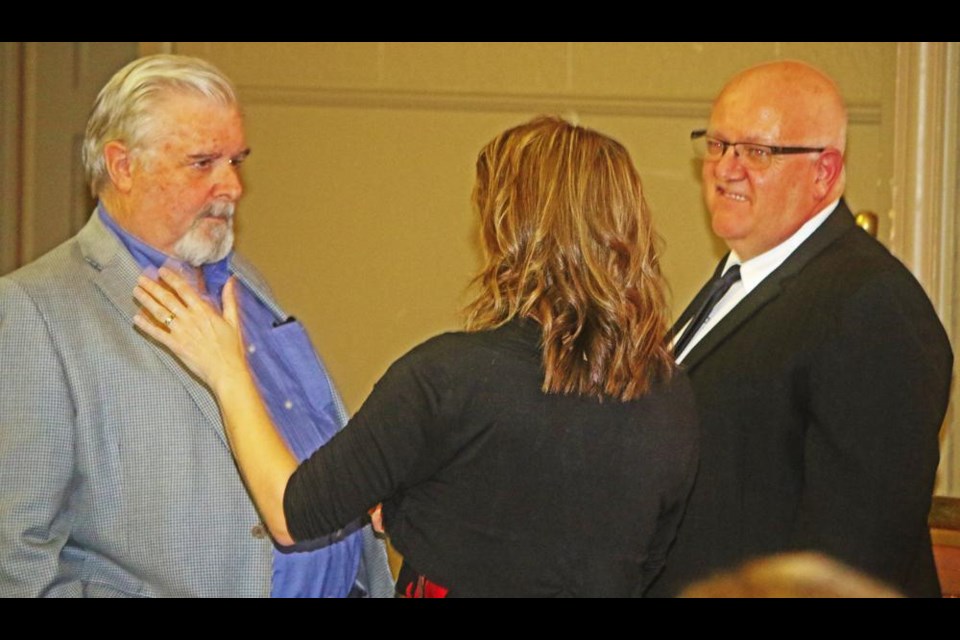WEYBURN – This province is in “Saskaboom 2.0” and entrepreneurs and business owners need to take the opportunity and run with it, business commentator Paul Martin told the Weyburn Chamber of Commerce on Wednesday.
The guest speaker for the President’s Dinner and AGM, Martin got his start in media working at CFSL radio for Tom Laing, and is now a partner with Marilyn Charlton in running Martin Charlton Communications in Regina.
“We’re in the midst of something special. We’re in what I would say is year two of a seven-year cycle – that’s the commodities cycle,” said Martin.
Appearing on John Gormley’s radio show with former premier Brad Wall, Martin mentioned the “Saskaboom 2.0” term and Wall said he didn’t like that term, “because you know what comes after.”
The staples of Saskatchewan’s economy is food, fuel, fertilizer, and more recently, forestry, with large announcements made in all of these sectors.
For example, he said, “uranium is on fire”, noting there have been two significant discoveries of uranium just in the last two weeks.
Even though uranium mostly affects the far northern part of the province, he said, “It’s going to be felt throughout Saskatchewan, so get ready, it’s coming.”
In agriculture, he asked the farmers in the room, “You remember $20 wheat?” One farmer said he remembered $2 wheat and 50-cent barley.
A factor here is going to be the invasion of Ukraine by Russia, he noted as “Ukraine is going to have a hell of a time planting a crop this year.”
With the sanctions against Russia, and Ukraine largely out of commission, Martin pointed out this is 30 per cent of the world’s wheat supply.
“They’re going to look for alternate suppliers, and that’s going to be us and Australia,” he said.
In regard to potash, a leading supplier, Belarus, is out of the running due to their connection to Russia, “so they need an alternate supplier.”
In addition, there are up-and-coming developments for such commodities as lithium and helium, not to mention small modular nuclear reactors with the prospect of the coal-fired power plants in Estevan and Coronach being shut down by 2030.
Martin pointed out that small modular nuclear plants are not new, as nuclear-powered submarines have been around for a long time. Plus, he noted when the Gardiner Dam was built on Lake Diefenbaker, the town of Cutbank was established with infrastructure for 2,500 people, because in 1959 the plan had been to put a nuclear plant there, “so it’s not a new idea.”
“We’re on the edge of something really big. The issue for us is, are we going to capitalize on it?” asked Martin.
Pointing out that Weyburn is the biggest inland grain-gathering point in Canada, he noted that five new canola crush plants were announced but not one of them in the biggest grain-gathering point.
“Where are you in the conversation on value-added?” he asked, and in regard to no canola crush plants here, “What is right with that picture? I’m challenging you. If you just wait for something to happen, it’s not going to happen.”
Martin said the opportunity for a canola crush plant is gone, with five new plants on the way, but he pointed out they will only process the oil from canola, which is 40 per cent of the plant – so what about the meal, which is 60 per cent of the plant?
One of the attitudes he has seen in this province, particularly in towns and small cities like Weyburn, is an attitude that is against success. He used the example of a hardware store operator in a small town getting a new truck, and having customers turn against him because clearly he’s doing well enough. He said he wants to see this attitude turned around to embrace growth and success.
“I grew up here, I want to see you succeed – but it’s got to be you. The timing has never been better, you’ve got to make it happen,” said Martin.





